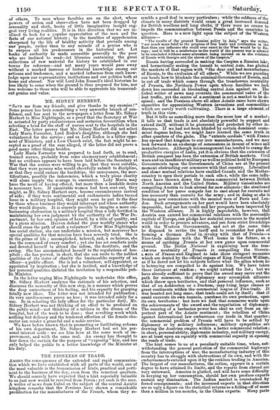R. SIDNEY HERBERT.
" SAVE me from my friends, and give thanks to my enemies !" Some person has been committing a very unworthy breach of con- fidence' and has sent to the newspapers a letter from Mr. Sidney Herbert to Miss Nightingale, as a proof that the Secretary at War is actuated by party exclusiveness and sectarian favouritism when selecting a head for the staff of nurses sent to the'hospitals in the East. The letter proves that Mr. Sidney Herbert did not select Lady Maria Forrester, Lord Roden's daughter, although she had volunteered for the service ; and as Lord Roden is a bitter oppo- nent of Ministers, and a Low Church saint, the fact might be ac- cepted as a proof of the case alleged, if the letter did not prove a good many other things besides. Lady Maria Forrester was prepared to lead forth, or to send, trained nurses, probably from some eleemosynary establishment ; but no evidence appears to have been laid before the Secretary at War that the nurses were -willing to go, that they were suitable, that they were persons who would cheerfully submit to discipline, or that they could endure the hardships, the annoyances, the mor- fificsrtions, possibly the indecencies, which a truly pious charity will alone supply the courage to encounter. Lady Maria may have the merit of having offered, but more than a laudable desire is necessary here. If unsuitable women had been sent out, they might, as Mr. Sidney Herbert says, become encumbrances instead of aids ; if they were sentimental and enthusiastic ladies turned loose in a military hospital, they might soon be put to the door by 'those whose business they would interrupt and whose authority they would dispute. It is scarcely possible to imagine a more em- harrassing obstruction in a military hospital than a lady fortified in maintaining her own judgment by the authority of the War De- partment, by her own opinion of herself, by a title of quality, and by a pious mission. Heaven defend the poor worldly sinner who should cross the path of such a volunteer ! Now Miss Nightingale has social station, she can undertake a mission, but moreover her -special qualities for that mission have been severely tried. She is in the prime of life ; accomplished, beloved, and, a co-heiress, she has the command of every comfort ; yet she has set comforts aside and devoted herself to attend the infirm, the destitute, and the erring. She has accommodated herself to the regulations of hos- pitals ; she has proved, in short, that she can unite to the noblest qualities of the sister of charity the businesslike capacity of an officer—a public officer. She is not a volunteer, self-appointed, or appointed by inspiration ; but she is invited, and a knowledge 'of her personal qualities dictated the invitation by a responsible pub- lic Minister.
In the letter urging Miss Nightingale to undertake this office, Mr. Sidney Herbert analyzes the rationale of his selection, -and discusses the necessity of this new step, in a manner -which proves -the deep earnestness of his feeling, and his capacity for grasping totally new ideas. The letter was not intended for publication ; its very carelessnesses prove no less ; it was intended solely for a use. So in selecting the lady officer for the particular duty, Mr. Sidney Herbert was not thinking of an effect to be produced on the public mind—not thinking of a tableau in the drama of the hospital, but of the work to be done ; that revolting work which nothing but delicacy and the tenderest affection of the female cha- racter can render a graceful and a noble service.
We have before known that in promoting or facilitating reforms of his own department, Mr. Sidney Herbert had set his per- sonal interest aside : we see him here at the same work of im- provement, and with the same zeal. An enemy has thought to tear down the curtain for the purpose of "exposing" him and has only helped the public to a better knowledge of the Minister at his duty.
























 Previous page
Previous page